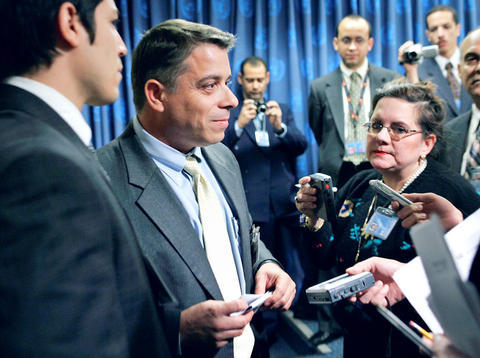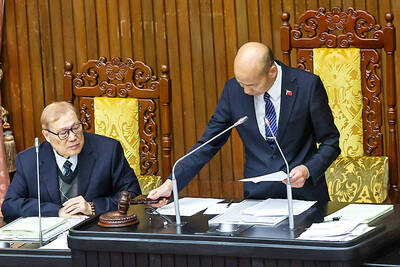Cuba on Thursday signed two cornerstone UN covenants on human rights passed more than 40 years ago in an unprecedented gesture that came just days after Raul Castro took over as president.
For decades, former president Fidel Castro had refused to sign the two covenants adopted by the UN General Assembly in 1966, saying to do so would be to cede to US pressure.
But Cuban Foreign Minister Felipe Perez Roque told reporters that foreign pressure played no part in his signing of the International Covenant on Economic, Social and Cultural Rights and the International Covenant on Civil and Political Rights.

PHOTO: AP
The signing "formalizes and reaffirms Cuba's commitment to the rights protected in both instruments, which my country has been systematically implementing since the time of the Cuban revolution in 1959," he said after conferring with UN Secretary-General Ban Ki-moon. "The act of signing both covenants responds to a sovereign decision of the Cuban government."
"Cuba has never acted nor will act under pressure," he said.
It was the first international act taken by the new leadership of Raul Castro, who took over on Sunday.
But Perez Roque said that "as far as the scope and application of several of the elements contained in these international instruments, Cuba will register those reservations or interpretative declarations it considers relevant."
Reacting to the signing of the rights treaties, the Cuban opposition demanded political pluralism and an end to harassment.
The most radical dissidents in Cuba denounced what they called "a farce" while their more moderate counterparts voiced hope the move would open the way for freedom of expression.
A total of 236 known political prisoners are held in Cuban jails.
"Now that Cuba has signed an international human rights treaty committing itself to uphold freedom of expression, it should immediately and unconditionally release the 22 independent journalists currently imprisoned for their work," said Carlos Lauria, Americas senior program coordinator for the Committee to Protect Journalists in New York.
Perez Roque also used the occasion to again call for the lifting of the US trade and economic embargo in force against his country since 1962.
The embargo and Washington's hostility against Cuba constitute the most serious obstacle to the enjoyment by the Cuban people of the rights protected by the covenants, he said.
Meanwhile, US President George W. Bush on Thursday slammed Raul Castro as a "tyrant" lacking legitimacy and unworthy of bilateral leadership-level talks.
"He's nothing more than the extension of what his brother did, which was to ruin an island and imprison people because of their beliefs," Bush told a White House press conference on Thursday.
Raul Castro was elected to the presidency in a vote by the national assembly.

DEFENDING DEMOCRACY: Taiwan shares the same values as those that fought in WWII, and nations must unite to halt the expansion of a new authoritarian bloc, Lai said The government yesterday held a commemoration ceremony for Victory in Europe (V-E) Day, joining the rest of the world for the first time to mark the anniversary of the end of World War II in Europe. Taiwan honoring V-E Day signifies “our growing connections with the international community,” President William Lai (賴清德) said at a reception in Taipei on the 80th anniversary of V-E Day. One of the major lessons of World War II is that “authoritarianism and aggression lead only to slaughter, tragedy and greater inequality,” Lai said. Even more importantly, the war also taught people that “those who cherish peace cannot

STEADFAST FRIEND: The bills encourage increased Taiwan-US engagement and address China’s distortion of UN Resolution 2758 to isolate Taiwan internationally The Presidential Office yesterday thanked the US House of Representatives for unanimously passing two Taiwan-related bills highlighting its solid support for Taiwan’s democracy and global participation, and for deepening bilateral relations. One of the bills, the Taiwan Assurance Implementation Act, requires the US Department of State to periodically review its guidelines for engagement with Taiwan, and report to the US Congress on the guidelines and plans to lift self-imposed limitations on US-Taiwan engagement. The other bill is the Taiwan International Solidarity Act, which clarifies that UN Resolution 2758 does not address the issue of the representation of Taiwan or its people in

The Philippines yesterday criticized a “high-risk” maneuver by a Chinese vessel near the disputed Scarborough Shoal (Huangyan Island, 黃岩島) in a rare incident involving warships from the two navies. The Scarborough Shoal — a triangular chain of reefs and rocks in the contested South China Sea — has been a flash point between the countries since China seized it from the Philippines in 2012. Taiwan also claims the shoal. Monday’s encounter took place approximately 11.8 nautical miles (22km) southeast” of the Scarborough Shoal, the Philippine military said, during ongoing US-Philippine military exercises that Beijing has criticized as destabilizing. “The Chinese frigate BN 554 was

LEISURE: The new law adds Confucius’ birthday, the anniversary of the Battle of Guningtou, Constitution Day and Little New Year as national holidays The Legislative Yuan yesterday passed new legislation adding four national holidays and making Workers’ Day a national holiday for all sectors. The Chinese Nationalist Party (KMT) and the Taiwan People’s Party used their combined majority in the legislature to push the jointly proposed draft through its third and final reading. This new law supersedes the existing regulations for the implementation of memorial days and state holidays, which are administered by the Ministry of the Interior. The new law recognizes Confucius’ birthday on Sept. 28, the anniversary of the Battle of Guningtou on Oct. 25, Constitution Day on Dec. 25 and “Little New Year,”